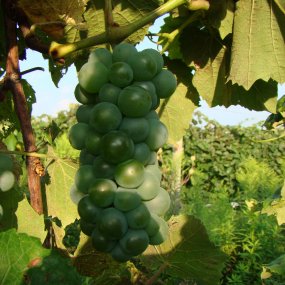Vine Finder
Get help finding and purchasing the grapevines that are just right for your region and preference. Use this tool to sort through our wide selection of varieties by zone, color, vigor, use and season.
Default Category, Plants, Grapevines, Resources, Vine Finder, Grapevines by Use, Decorative, Grapevines by Zone, Hardiness Zone 4, Hardiness Zone 5, Hardiness Zone 6, Hardiness Zone 7, Hardiness Zone 8, Certified Availability 2020, 2020 Certified Availability
3309 (Couderc 3309)
Couderc 3309 is a standard rootstock in the eastern United States. It is a vigorous male sterile variety with attractive leaves and shoots. Great for decorative arbors where fruit is not wanted.
Default Category, Plants, Grapevines, Resources, Vine Finder, Grapevines by Use, Wine, Grapevines by Zone, Hardiness Zone 5, Hardiness Zone 6, Hardiness Zone 7, Hardiness Zone 8, Hybrid Varieties
DeChaunac
DeChaunac is a productive, vigorous variety with large, loose clusters resistant to bunch rots. Cluster thinning is usually required to produce quality wines as overcropped vines are known to produce relatively low qual...
Default Category, Plants, Grapevines, Resources, Vine Finder, Grapevines by Use, Wine, Grapevines by Zone, Hardiness Zone 6, Hardiness Zone 7, Hardiness Zone 8, Grafted Vinifera, Grafted Hybrids, Certified Availability 2020, Grapevines by Rootstock, 3309 Rootstock
Dornfelder - Grafted
Dornfelder is considered to be the most successful red German vinifera cross with substantial plantings in the late 20th Century. The wine is notable for its depth of color, good acidity, attractive aromatics, and abili...
Default Category, Plants, Grapevines, Resources, Vine Finder, Grapevines by Use, Wine, Juice, Table, Jelly, Grapevines by Zone, Hardiness Zone 4, Hardiness Zone 5, Hardiness Zone 6, Hardiness Zone 7, Hardiness Zone 8, American Varieties
Edelweiss
Developed as a table grape, Edelweiss has medium-sized berries on large loose clusters. Wine is usually finished sweet and has pineapple overtones; fruit should be harvested at 14°- 16° brix to avoid strong Labrusca ...
Default Category, Plants, Grapevines, Resources, Vine Finder, Grapevines by Use, Table, Grapevines by Zone, Hardiness Zone 5, Hardiness Zone 6, Hardiness Zone 7, Hardiness Zone 8, Seedless Grapes
Einset Seedless
Einset Seedless produces medium-sized clusters with oval, bright red berries with a light waxy bloom. Tender to firm flesh with Labrusca and strawberry character, medium-sized soft seed remnant is not usually noticeable.
Default Category, Plants, Grapevines, Resources, Vine Finder, Grapevines by Use, Wine, Grapevines by Zone, Hardiness Zone 3, Hardiness Zone 4, Hardiness Zone 5, Hardiness Zone 6, Hardiness Zone 7, Hardiness Zone 8, American Varieties
Elvira
Elvira is vigorous and hardy, producing medium-sized white berries that ripen with Concord. Tolerates a wide range of soil conditions. Absence of cultural problems makes this variety recommended for difficult growing are...
Default Category, Plants, Grapevines, Resources, Vine Finder, Grapevines by Use, Table, Grapevines by Zone, Hardiness Zone 5, Hardiness Zone 6, Hardiness Zone 7, Hardiness Zone 8, Seedless Grapes
Faith
Faith - [PP25,696] is a blue, non-slipskin, seedless grape that is the earliest maturing of the 2012 Arkansas table grape releases - late July to early August in Arkansas. It has neutral to slightly fruity flavor. Vines...
Default Category, Plants, Grapevines, Resources, Vine Finder, Grapevines by Use, Wine, Juice, Table, Jelly, Grapevines by Zone, Hardiness Zone 4, Hardiness Zone 5, Hardiness Zone 6, Hardiness Zone 7, Hardiness Zone 8, American Varieties
Fredonia
Fredonia is an early Concord-type, ripening about two weeks earlier. Valued for both table grape production and for wine.
Default Category, Plants, Grapevines, Resources, Vine Finder, Grapevines by Use, Wine, Grapevines by Zone, Hardiness Zone 3, Hardiness Zone 4, Hardiness Zone 5, Hardiness Zone 6, Hardiness Zone 7, Hardiness Zone 8, Hybrid Varieties
Frontenac
Frontenac produces grapes with high sugar and high acidity used to produce dry red wine, rosé, and port. Wines typically present aromas of cherry and other red fruits. Acid reducing techniques are often used by the wine...
Default Category, Plants, Grapevines, Resources, Vine Finder, Grapevines by Use, Wine, Grapevines by Zone, Hardiness Zone 3, Hardiness Zone 4, Hardiness Zone 5, Hardiness Zone 6, Hardiness Zone 7, Hardiness Zone 8, Hybrid Varieties
Frontenac Blanc
Frontenac Blanc is a white-fruited mutation of Frontenac. The variety is relatively new, early wine evaluation suggests it will produce wines distinctly different from Frontenac Gris.
Default Category, Plants, Grapevines, Resources, Vine Finder, Grapevines by Use, Wine, Grapevines by Zone, Hardiness Zone 3, Hardiness Zone 4, Hardiness Zone 5, Hardiness Zone 6, Hardiness Zone 7, Hardiness Zone 8, Hybrid Varieties
Frontenac Gris
Frontenac Gris is a bud sport of Frontenac, identical in most respects but lacking dark skin color. Frontenac Gris is usually cold pressed to make a white wine that can present aromas of peach and apricot with hints of ...
Default Category, Plants, Grapevines, Resources, Vine Finder, Grapevines by Use, Wine, Grapevines by Zone, Hardiness Zone 7, Hardiness Zone 8, Grafted Vinifera, Grafted Hybrids, Certified Availability 2020, Grapevines by Rootstock, 101-14 Rootstock
Gewürztraminer - Grafted
Gewürztraminer is a musqué mutation of Traminer that produces compact clusters of small, spicy, pinkish-red grapes with high natural sugar and low acidity, so is best suited for cooler climates. The best wines exhibit ...
Default Category, Plants, Grapevines, Resources, Vine Finder, Grapevines by Use, Table, Grapevines by Zone, Hardiness Zone 6, Hardiness Zone 7, Hardiness Zone 8, Seedless Grapes
Glenora
Glenora is a high quality seedless variety that produces medium-sized blue berries with mild and pleasant flavor.
Out of Stock
Default Category, Plants, Grapevines, Resources, Vine Finder, Grapevines by Use, Wine, Table, Grapevines by Zone, Hardiness Zone 5, Hardiness Zone 6, Hardiness Zone 7, Hardiness Zone 8, American Varieties
Golden Muscat
An older Cornell release, Golden Muscat was first promoted as a table grape. It produces very large, well-filled clusters of large, oval, amber-colored berries. When fully ripe the flavor is rich, when not fully ripe, G...
$12.75
As low as
$4.75
Out of stock
View Details
Default Category, Plants, Grapevines, Resources, Vine Finder, Grapevines by Use, Table, Grapevines by Zone, Hardiness Zone 5, Hardiness Zone 6, Hardiness Zone 7, Hardiness Zone 8, Seedless Grapes
Gratitude
Gratitude - [PP25,746] has an exceptional crisp texture with seedless green berries. Skin is very thin and in most years no seed traces are found. Flavor is neutral, similar to most Vitis vinifera table grape varieties. ...
Default Category, Plants, Grapevines, Resources, Vine Finder, Grapevines by Use, Wine, Grapevines by Zone, Hardiness Zone 6, Hardiness Zone 7, Hardiness Zone 8, Grafted Vinifera, Grafted Hybrids, Grapevines by Rootstock, 101-14 Rootstock
Gruner Veltliner - Grafted
Gruner Veltliner is the most planted grape variety in Austria and is widely grown in eastern Europe, but too late-ripening for more northern regions. Wines are typically finished dry and are peppery or spicy.
Default Category, Plants, Grapevines, Resources, Vine Finder, Grapevines by Use, Table, Grapevines by Zone, Hardiness Zone 5, Hardiness Zone 6, Hardiness Zone 7, Hardiness Zone 8, Seedless Grapes
Himrod
Vigorous vines produce large, loose clusters of oval, soft, flavorful berries. Grapes have a honey-like flavor and a melting, juicy texture.
Default Category, Plants, Grapevines, Resources, Vine Finder, Grapevines by Use, Table, Grapevines by Zone, Hardiness Zone 5, Hardiness Zone 6, Hardiness Zone 7, Hardiness Zone 8, Seedless Grapes
Hope
Hope - [Pat. PP25,697] is a green seedless grape with a fruity flavor and high yields. Berries are non-slipskin, typically without traces of seeds, while fruit texture is soft. Vines are moderate in vigor, but negative o...
Default Category, Plants, Grapevines, Resources, Vine Finder, Grapevines by Use, Wine, Table, Grapevines by Zone, Hardiness Zone 5, Hardiness Zone 6, Hardiness Zone 7, Hardiness Zone 8, American Varieties
Isabella
In the early 1800s, Isabella was widely planted in the North Atlantic and New England States where Catawba could not reliably ripen, but it fell out of favor after Concord was introduced. Isabella can withstand tropical...
Default Category, Plants, Grapevines, Resources, Vine Finder, Grapevines by Use, Table, Grapevines by Zone, Hardiness Zone 5, Hardiness Zone 6, Hardiness Zone 7, Hardiness Zone 8, Seedless Grapes
Joy
Joy - [PP25,726] is a blue, non-slipskin, seedless grape with thin skin and exceptional fruity flavor. Sometimes contains hard seed traces. Fruit cracking is rare but ripe berries may shatter at maturity in some years. ...
Default Category, Plants, Grapevines, Resources, Vine Finder, Grapevines by Use, Table, Grapevines by Zone, Hardiness Zone 5, Hardiness Zone 6, Hardiness Zone 7, Hardiness Zone 8, Seedless Grapes
Jupiter
Jupiter - [Pat. PP13,309] has large clusters of large, reddish-blue berries with mild muscat flavor. Non-slipskin with crisp flesh texture, although skins are relatively thin, fruit cracking is not common.
*Propagatio...
Default Category, Plants, Grapevines, Resources, Vine Finder, Grapevines by Use, Wine, Grapevines by Zone, Hardiness Zone 6, Hardiness Zone 7, Hardiness Zone 8, Grafted Vinifera, Grafted Hybrids, Certified Availability 2020, Grapevines by Rootstock, 101-14 Rootstock
Kerner - Grafted
Considered a success story of modern German vine breeding, Kerner became widely planted in Germany in the 1990s. Typically used to make high quality wines similar to Riesling in many respects including high acidity, but...
Default Category, Plants, Grapevines, Resources, Vine Finder, Grapevines by Use, Wine, Grapevines by Zone, Hardiness Zone 3, Hardiness Zone 4, Hardiness Zone 5, Hardiness Zone 6, Hardiness Zone 7, Hardiness Zone 8, Hybrid Varieties
La Crescent
La Crescent is one of the more popular Northern varieties and includes Muscat Hamburg in its geneology. La Crescent has high acidity and is used to produce off-dry to sweet wines, typically with apricot, peach, and citr...
Default Category, Plants, Grapevines, Resources, Vine Finder, Grapevines by Use, Wine, Table, Grapevines by Zone, Hardiness Zone 6, Hardiness Zone 7, Hardiness Zone 8, Seedless Grapes
Lakemont
A full sibling of Himrod, Lakemont has milder flavor and more compact clusters with fairly small berries. Not as winter hardy as Himrod.
Default Category, Plants, Grapevines, Resources, Vine Finder, Grapevines by Use, Wine, Grapevines by Zone, Hardiness Zone 4, Hardiness Zone 5, Hardiness Zone 6, Hardiness Zone 7, Hardiness Zone 8, Hybrid Varieties
Landot Noir (Landot 4511)
Landot Noir has both late bud break and early maturity, making it suitable for short-season climates. Makes a mild, fruity red wine used as a varietal or for blending.

























